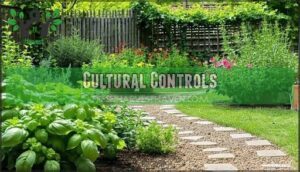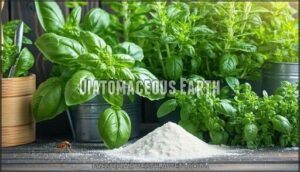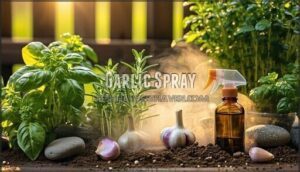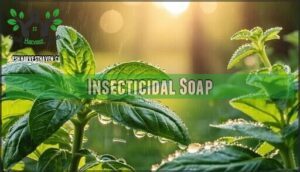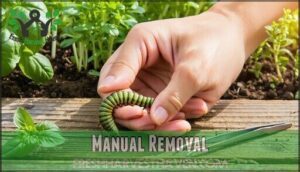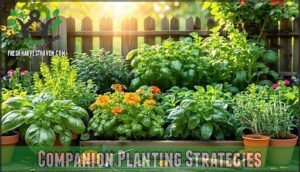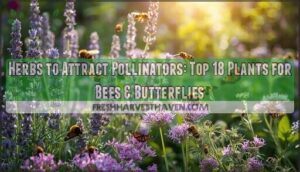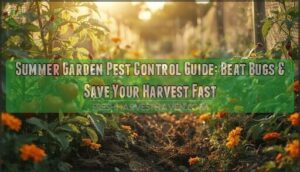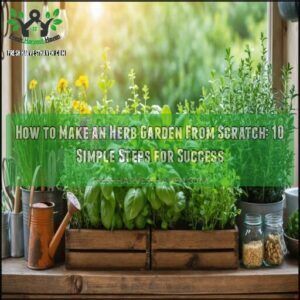This site is supported by our readers. We may earn a commission, at no cost to you, if you purchase through links.
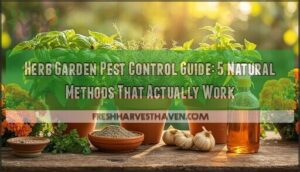
This herb garden pest control guide focuses on five natural methods that actually work. You’ll tackle aphids clustering on basil, spider mites webbing your oregano, and caterpillars munching through parsley leaves using proven organic solutions.
Companion planting with marigolds repels many invaders, while beneficial insects like ladybugs become your garden allies. Diatomaceous earth creates barriers against crawling pests, and homemade garlic sprays deter flying insects without harming plant flavor.
These time-tested approaches protect both your herbs and beneficial pollinators. The secret lies in understanding which pests target specific herbs and timing your interventions perfectly.
Table Of Contents
- Key Takeaways
- Common Herb Pests
- Preventing Herb Pests
- Natural Pest Control Methods
- Managing Herb Diseases
- Companion Planting Strategies
- Frequently Asked Questions (FAQs)
- What is the best pest control for vegetable garden?
- What herb keeps bugs away in the garden?
- How do I stop bugs from eating the leaves of my plants?
- How do I keep bugs off my herb garden?
- What pesticide to use on herbs?
- How do you keep critters out of your herb garden?
- What is safe bug repellent for herbs?
- How do I keep bugs away from my herb garden?
- Do beneficial bugs eat herbs?
- How do you get rid of pests on herbs?
- Conclusion
Key Takeaways
- You’ll prevent most herb pest problems by using companion planting with marigolds, chives, and garlic that naturally repel aphids, spider mites, and caterpillars before they can establish colonies.
- You can eliminate existing pests safely using organic methods like diatomaceous earth barriers, garlic spray applications, and insecticidal soap treatments that won’t contaminate your cooking herbs.
- You’ll create a self-sustaining defense system by attracting beneficial insects like ladybugs and parasitic wasps that devour harmful pests while protecting pollinators essential for garden health.
- You should identify pest damage early by checking for sticky honeydew from aphids, fine webbing from spider mites, and silvery slug trails to stop infestations before they spread throughout your herb garden and use insecticidal soap to prevent further damage.
Common Herb Pests
Your herb garden faces constant threats from tiny invaders that can destroy months of careful cultivation.
These common pests target specific herbs and cause distinct damage patterns that help you identify problems before they spread, which is crucial for maintaining a healthy herb garden.
Aphids and Whiteflies
You’ll spot these tiny green, black, or white insects clustered on your basil and mint leaves.
Aphids pierce plant tissue and multiply rapidly—up to 80 offspring weekly.
Tiny green vampires can produce hundreds of babies in just one week.
Whiteflies flutter when disturbed and hide under leaves. Both pests leave sticky honeydew that attracts mold.
Check leaf undersides during garden inspection for early pest identification. Natural pest control works best, and it’s essential to identify these pests to apply the control effectively, which can be achieved by checking for early pest identification.
Spider Mites and Caterpillars
Spider mites attack dill, cilantro, and basil, leaving fine webs and causing leaf loss during hot, dry weather.
These herb garden pests multiply rapidly through their pest life cycle. Look for infestation signs like stippled leaves and webbing.
For mite control, spray water daily and improve humidity.
Caterpillar prevention involves checking for eggs on parsley and fennel. Manual web removal works for small infestations using natural pest control methods.
Snails and Slugs
These slimy garden pests destroy young basil, mint, and thyme by eating leaves, especially in wet conditions.
You’ll find them hiding under mulch or plant debris during daylight hours.
Combat these herb garden pests with copper barriers around beds, organic slug baits, or simple snail traps filled with beer.
Garden cleanliness removes their hiding spots effectively, which can be considered a simple method to control these pests.
Pest Damage Descriptions
Recognizing pest damage early prevents major infestations from destroying your herb garden.
Pest identification becomes easier when you know what signs to look for during damage assessment.
- Aphid damage – Sticky honeydew coating leaves, yellowing foliage, and curled leaf edges
- Spider mite symptoms – Fine webbing on stems, stippled leaves with tiny yellow spots
- Caterpillar destruction – Large irregular holes chewed through leaf centers and edges
- Slug trails – Silvery slime paths leading to completely eaten seedlings and tender shoots
Preventing Herb Pests
You can stop most herb pests before they start by using smart prevention methods that work with nature.
The key is creating conditions that favor your herbs while making life difficult for unwanted insects and slugs, which is a complete concept in pest control.
Biological Controls
Nature’s army stands ready to defend your herb garden.
Your herb garden’s greatest allies are already buzzing around, ready to wage war on pests naturally.
Beneficial insects like ladybugs devour aphids while parasitic wasps target specific pests.
Biological agents such as Bacillus thuringiensis and beneficial nematodes attack harmful insects from within.
Microbial pesticides offer organic pest control without chemicals.
Companion planting attracts these natural allies, creating a self-sustaining defense system that keeps your herbs thriving.
By maintaining a healthy ecosystem, gardeners can prevent pest issues and promote a balanced environment for their herbs to grow, using organic pest control.
Natural Products
Three powerful natural products transform your herb garden into a pest-free zone.
Essential oils like peppermint and rosemary create natural repellents that bugs hate.
Garlic spray made from pureed cloves repels soft-bodied insects when applied daily.
Botanical extracts from neem trees disrupt pest life cycles.
These organic pest control solutions work without harming beneficial insects.
Using effective natural pest control methods is vital for a healthy garden.
Physical Barriers
Several physical barriers can block pests from reaching your herbs without chemicals.
These garden pest control methods create walls that crawling insects can’t cross.
- Row covers made of fine mesh protect young plants from flying pests like whiteflies
- Copper barriers around containers stop slugs and snails with mild electrical charges
- Diatomaceous earth sprinkled around plants cuts soft-bodied insects that try to crawl through
- Barrier fencing keeps larger pests like rabbits away from your herb garden
Cultural Controls
Beyond barriers, cultural controls shape your herb garden’s environment to prevent pest problems.
Smart sanitation methods and soil management create conditions pests can’t thrive in.
| Cultural Control | Method | Target Pest |
|---|---|---|
| Proper spacing | Allow airflow between plants | Spider mites, fungal issues |
| Water at soil level | Avoid wet foliage | Snails, slugs, disease |
| Remove plant debris | Clean up fallen leaves weekly | Overwintering pests |
| Rotate herb locations | Move plants yearly | Soil-dwelling larvae |
These organic pest control methods work by disrupting pest life cycles naturally.
Pruning techniques and water conservation support healthy plants that resist attack better than stressed ones.
Effective pest control methods are essential for maintaining a healthy herb garden.
Natural Pest Control Methods
When pests invade your herb garden, you don’t need harsh chemicals to fight back effectively. These four natural methods work fast and keep your herbs safe for cooking and eating.
Diatomaceous Earth
Diatomaceous earth creates an invisible fortress around your herbs. This fossilized algae powder works like microscopic glass shards that slice through pest exoskeletons, causing dehydration.
Here’s how to deploy this natural defense:
- Dust plant leaves lightly with food-grade diatomaceous earth
- Ring individual plants with thin powder barriers
- Reapply after watering since moisture reduces effectiveness
This organic pest control method targets crawling insects while improving soil drainage naturally. For effective results, consider the organic gardening methods to keep your herb garden healthy.
Garlic Spray
Looking at this powerful organic pest management solution, garlic spray transforms your kitchen staple into a botanical pest control weapon.
You’ll create effective herbal pest solutions by blending pureed garlic cloves with water. This ecofriendly pest control method offers impressive garlic benefits against soft-bodied insects.
Apply your homemade spray recipes daily for garden safety. The natural pest control approach repels pests through strong aromatic compounds, making it essential for organic methods and utilizing the benefits of garlic spray as a botanical pest control weapon.
Insecticidal Soap
This gentle giant of organic pest management tackles aphids, mites, and scales head-on.
Insecticidal soap works by breaking down pest cell membranes on contact. You’ll want to spray directly on bugs during cooler morning hours.
The soap ingredients are safe around kids and pets, making it perfect for kitchen herb gardens. Reapply every few days until pests disappear.
For effective pest control, understanding insecticidal soap properties is essential to manage organic pest issues with insecticidal soap.
Manual Removal
Sometimes the old-school approach works best.
Hand picking pests off your herbs gives you total control over infestation signs.
Grab removal tools like tweezers for precision work.
Check plants daily during pest inspection rounds.
Common garden pests like caterpillars can’t hide from your eagle eyes.
Manual removal paired with garden sanitation creates effective natural pest control and pest prevention.
Managing Herb Diseases
While pests grab attention in your herb garden, diseases can quietly destroy your plants before you notice.
Fungal infections, bacterial spots, and viral diseases spread fast in humid conditions and can wipe out entire crops if left unchecked, due to fungal infections being a common issue.
Fungal Diseases
Fungal infections cause 85% of herb plant diseases and spread quickly through moisture.
You’ll spot powdery mildew as white patches on leaves, while root rot kills plants from below.
Leaf spot creates brown circles on foliage.
Soil fungus thrives in wet conditions, making mold control essential.
Remove infected plants immediately and avoid watering leaves directly to prevent the spread of fungal infections.
Bacterial Diseases
Bacterial symptoms show up as black spots, wilted leaves, and slimy stems on your herbs.
These plant diseases spread fast in wet conditions. Good soil health prevents most problems.
Watch for root rot in basil and foliar diseases on mint.
Natural pest control starts with proper spacing and drainage. Organic pest solutions include copper sprays and removing infected plants quickly.
Effective herb garden management involves understanding common herb garden pests to prevent disease outbreaks, using methods like proper spacing and copper sprays.
Viral Diseases
Viral diseases turn your herbs into unwelcome guests at their own party. Unlike bacterial infections, viruses can’t be cured once they take hold. Your best defense is prevention and boosting plant resistance through proper care.
- Virus Transmission occurs through insects, contaminated tools, or infected plants
- Disease Symptoms include mosaic patterns, stunted growth, and leaf distortion
- Plant Resistance strengthens with proper spacing and good air circulation
- Immune Boosters like compost tea support overall plant health
- Herbal Remedies focus on prevention rather than treatment after infection
Environmental Factors
Your herb garden’s health hinges on Weather Patterns, Soil Quality, Air Circulation, Water Management, and Temperature Control.
Warm, humid conditions breed disease while poor drainage creates fungal havens.
Overcrowded plants lack airflow, trapping moisture.
These organic gardening methods and sustainable pest control practices support ecocconscious gardening.
Monitor environmental sustainability in gardening by spacing plants properly and using natural pest deterrents to ensure sustainable practices.
Companion Planting Strategies
You can turn your herb garden into a natural fortress by strategically planting pest-repelling companions alongside your culinary herbs.
Smart companion planting creates a self-protecting ecosystem where certain plants act as bodyguards for your basil, mint, and parsley.
Pest-Repelling Herbs
Certain herbs work like nature’s bodyguards for your garden.
Basil repels flies and mosquitoes while protecting tomatoes from hookworm.
Plant garlic to deter root maggots, cabbage loopers, and slugs with its strong scent.
Mint keeps ants and aphids away, but grow it in containers since it spreads aggressively.
These pest repelling herbs offer organic methods for natural pest control without chemicals.
Beneficial Insects
Many gardeners overlook the army of tiny heroes working in their herb patches.
Ladybugs Role in natural pest control means they’ll devour 50 aphids daily.
Bees Importance extends beyond pollination – they signal garden health.
Beneficial Wasps hunt caterpillars relentlessly.
Creating Butterfly Gardens attracts these pollinators while supporting Pollinator Health through organic pest control methods.
Companion Planting Examples
Around your herb garden, strategic plant combinations create natural pest barriers.
Chives planted near basil repel aphids and carrot flies while attracting beneficial pollinators. Garlic deters spider mites and fungus gnats when grown alongside parsley.
These herb pairings form effective pest repellents in compact garden layouts, supporting organic gardening without chemicals.
By implementing effective companion planting strategies, gardeners can reduce pest problems and improve crop yields.
Integrated Pest Management
Smart gardeners combine multiple tactics for maximum impact.
Pest monitoring helps you catch problems early.
Crop rotation prevents pest buildup in soil.
Healthy soil creates strong plants that resist damage naturally.
Integrated strategies work together like a well-oiled machine.
Natural insecticides and botanical pesticides provide backup when needed.
This ecosystem balance approach keeps your herbs thriving year-round, using integrated strategies and natural insecticides to maintain healthy soil.
Frequently Asked Questions (FAQs)
What is the best pest control for vegetable garden?
Pest attacks destroy up to 40% of global crops annually. You’ll want integrated pest management combining companion planting, beneficial insects, organic sprays, and crop rotation for effective control.
What herb keeps bugs away in the garden?
Basil repels flies and mosquitoes while protecting tomatoes from pests.
Chives deter aphids, deer, and carrot flies.
Garlic keeps away fungus gnats and spider mites.
Mint drives off flies and fleas effectively, with Mint being a key natural repellent.
How do I stop bugs from eating the leaves of my plants?
You can stop bugs from eating your plant leaves by spraying them with water daily, applying insecticidal soap for aphids, using diatomaceous earth barriers, and companion planting with pest-repelling herbs.
How do I keep bugs off my herb garden?
Plant companion herbs like chives, garlic, and basil to naturally repel pests.
Use diatomaceous earth around plants as a physical barrier.
Spray insecticidal soap or garlic solution on affected areas.
Remove pests manually and maintain good airflow between plants.
What pesticide to use on herbs?
Countless gardeners swear by safe, natural pesticides for herbs you’ll actually eat! Use insecticidal soap, diatomaceous earth, or garlic spray. These won’t harm you but kill soft-bodied pests effectively.
How do you keep critters out of your herb garden?
Use companion planting with chives, garlic, and mint to repel pests naturally.
Apply diatomaceous earth around plants as a physical barrier.
Spray garlic solution daily on leaves to deter soft-bodied insects effectively.
What is safe bug repellent for herbs?
Though synthetic pesticides seem necessary, natural repellents work effectively on herbs.
You can safely use diatomaceous earth, insecticidal soap, garlic spray, or water sprays.
These won’t harm your edible plants while controlling aphids, mites, and other pests.
How do I keep bugs away from my herb garden?
Plant companion herbs like chives, garlic, and basil to repel pests naturally.
Spray with water or garlic solution weekly.
Apply diatomaceous earth around plants.
Remove pests by hand and maintain proper spacing for airflow.
Do beneficial bugs eat herbs?
Beneficial insects don’t typically eat your herbs directly.
They’re your garden’s natural pest control team, feeding on harmful bugs that damage plants.
Ladybugs, lacewings, and parasitic wasps hunt aphids and other troublemakers while leaving your herbs untouched.
How do you get rid of pests on herbs?
You’ll tackle herb pests using several methods.
Spray plants with water to knock off whiteflies and aphids. Apply insecticidal soap for mites and scales.
Use garlic spray daily against soft-bodied insects. Sprinkle diatomaceous earth around plants as a natural barrier.
Hand-pick larger pests like caterpillars.
Conclusion
Victory tastes sweetest when it’s natural.
Your herb garden pest control guide now empowers you with five proven methods that protect your culinary treasures without compromising flavor or safety.
From diatomaceous earth barriers to beneficial insect allies, you’ve discovered sustainable solutions that work with nature, not against it.
These organic approaches safeguard both your harvest and the environment, allowing you to start implementing these strategies today.
Watch your herbs thrive while pests retreat naturally.
- https://www.gardeningknowhow.com/edible/herbs/hgen/herb-growing-problems.htm
- https://www.gardenary.com/blog/the-best-herbs-to-plant-in-your-kitchen-garden-to-repel-garden-pests
- https://www.azurefarmlife.com/farm-blog/herbs-and-flowers-for-organic-pest-control-in-the-garden
- https://zerowastehomestead.com/companion-gardening-guide-how-to-use-companion-planting-for-garden-pest-control/
- https://bloomscape.com/plant-care/how-to-remove-pests-from-your-indoor-herb-garden/?srsltid=AfmBOooJe6Dbwfvg69UlYlWZH0Dqb67DFWKXKbjDsM7hSbvLM8H_zQRL



